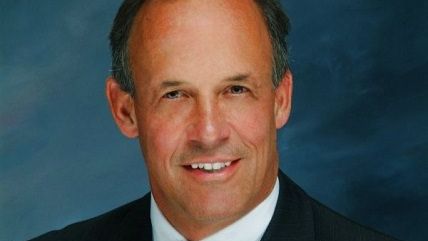ACLU Sues Mayor, Cops For Arrest of Twitter Parodist
Note to mayors: If you arrest people for saying things on the internet, you are the ones taking away freedom of speech.


Remember Peoria, Illinois, Mayor Jim Ardis, who tasked local law enforcement with finding and destroying a Twitter account that insulted him?
The American Civil Liberties Union just filed a lawsuit against Ardis, other city officials, and the police department on behalf of 29-year-old Jon Daniel, the creator of the Twitter account that parodied the mayor.
Daniel's home was raided, his property confiscated, and his friend charged with marijuana possession. Authorities initially wanted to charge Daniel with falsely impersonating a public official, even though it was obvious that the Twitter account did not actually belong to Ardis. The state attorney general ultimately agreed and declined to prosecute.
According to an ACLU press release:
The lawsuit, filed in federal district court yesterday afternoon, charges that Mayor Ardis, along with Peoria's City Manager, the Assistant City Manager, the Chief Information Officer, former Chief of Police and two police detectives violated Mr. Daniel's First and Fourth Amendment rights by launching a police investigation based on his speech and then searching his home as part of that investigation.
… "Political parody is a great tradition in the United States — from Thomas Nast to Jon Stewart," said Harvey Grossman, legal director for the ACLU of Illinois and the lead attorney representing Mr. Daniel. "In a number of public statements, the Mayor and Peoria officials have been unapologetic about their activities," added Grossman. "The only way to hold these government officials accountable is to have a federal court rule that their actions violated the fundamental constitutional rights of our client."
Ardis was excoriated by national news media for his actions. He doesn't think he did anything wrong, however. In fact, he thinks he is the victim, and his free speech was violated:
"I still maintain my right to protect my identity is my right," Ardis said in an interview with the Journal Star before the council meeting.
"Are there no boundaries on what you can say, when you can say it, who you can say it to?" Ardis said. "You can't say (those tweets) on behalf of me. That's my problem. This guy took away my freedom of speech."
Note to mayors: If you arrest people for saying things on the Internet, you are the ones taking away freedom of speech.
Editor's Note: As of February 29, 2024, commenting privileges on reason.com posts are limited to Reason Plus subscribers. Past commenters are grandfathered in for a temporary period. Subscribe here to preserve your ability to comment. Your Reason Plus subscription also gives you an ad-free version of reason.com, along with full access to the digital edition and archives of Reason magazine. We request that comments be civil and on-topic. We do not moderate or assume any responsibility for comments, which are owned by the readers who post them. Comments do not represent the views of reason.com or Reason Foundation. We reserve the right to delete any comment and ban commenters for any reason at any time. Comments may only be edited within 5 minutes of posting. Report abuses.
Please to post comments


John Edward has a new rival for Biggest Douche in the Universe award.
Like the club tie, and the firm handshake,
A certain look in the eye and an easy smile.
The massive amount of real estate on the forehead and the beady eyes?
Is there some kind of authoritarian thug playbook out there that has all this stuff in it? The cops who were fired for beating Kelly Thomas to death in the street also played the "I'm the real victim here because people said mean stuff about me on the internet" card.
Kinda like the GA sheriff who asked people to pray for his thugs? Makes you wonder.
"I still maintain my right to protect my identity is my right"
Rhetorical tautologies state the same thing twice, while appearing to state two or more different things, while logical tautologies state the same thing twice and must do so by logical necessity; idiotic tautologies, as we see here, just repeat themselves nonsensically like a 2 year old who want their sister's juice box instead of the one they already have.
That's how Illinois rolls, man!
If I as a Peoria resident, went to Mayor Ardis and said "Some guy is making fun of me on the internet. Acting like me and stuff.", I wonder how quickly he'd send his SWAT goons after them. I mean, that's a legitimate use of his enforcers, right?
If the guy lived in another state, I'm sure the Mayor would help me report it to the FBI with great haste. If he recognizes that would be an illegitimate use of force on 3rd parties, then he knows damn well it's not legitimate for him.
If he was acting LIKE you, then you'd be presenting Ardis with a completely different scenario than the one he is kvetching about.
The guy Ardis whined about didn't act ANYTHING like a thin-skinned, whiny, vindictive, authoritarian.
True enough. I just wonder if the Peoria police is empowered by law to provide Twitter Parody Protection to all the good citizens of Peoria. Or does he just reserve that protection for himself alone, as the head of the legal mafia's local franchise?
There's actually nothing surprising about Twitter parodists being viciously tracked down by the police, because if we don't speak up for everybody's rights, we better be ready for our own rights to be trampled on when we least expect it. It starts with criminalizing deadpan academic satire in the form of "Gmail confessions," and from there it moves to criminalizing Twitter parodies. See the documentation of America's leading criminal-satire case at:
http://raphaelgolbtrial.wordpress.com/
Despite being widely reported on in the press, the case ? even the strong dissenting opinion of Chief Judge Jonathan Lippman of the New York Court of Appeals ? has been ignored by nearly every legal commentator in the country, so it's not at all surprising that the police now feel free to go after the creators of Twitter accounts embarrassing to wealthy and powerful members of the community, whether they be politicians, university presidents, or anyone else ordinary people might choose to mimic and mock on the Internet.